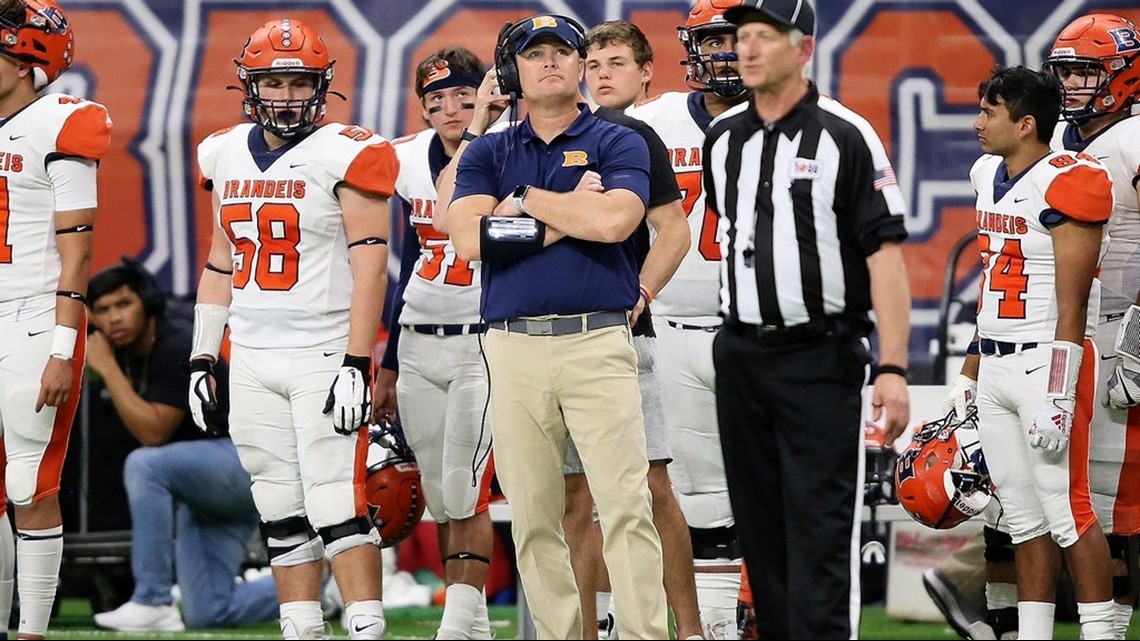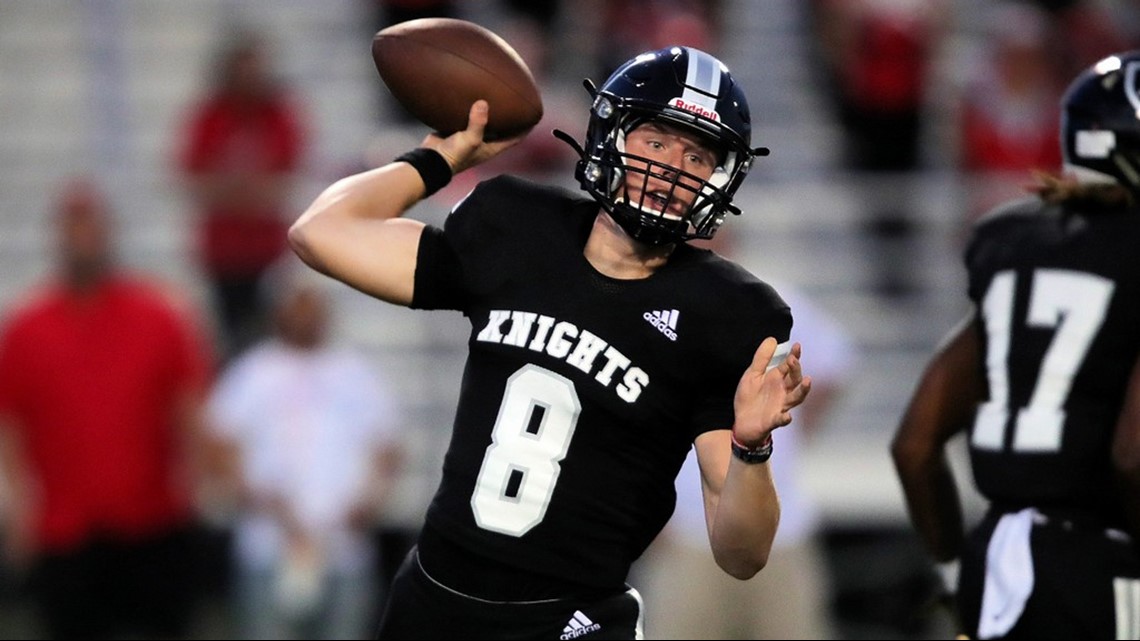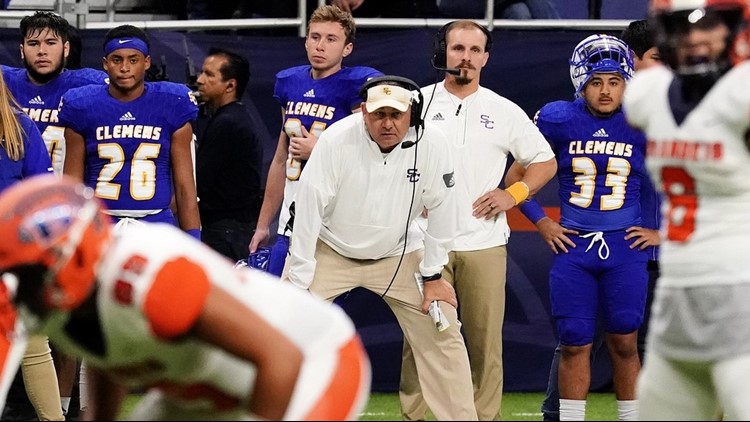SAN ANTONIO — Separated from their players since the scourge of the coronavirus pandemic started closing campuses in mid-March, Texas high school football coaches are keeping their teams together through technology.
With less than a month left in an academic year that shifted to online classes after the shutdown of schools, coaches have stayed in touch with their players through virtual Zoom video conferences.
"First, we just talk about everything but football," Clemens coach Jared Johnston said Monday. "We want to know how our kids are doing and how their families are doing. We want to make sure they're safe."
"As we've moved along, we've talked about the x's and o's. We've talked about our terminology. We think that's important because when we get back we don't want the kids to wonder, 'What does that word mean?'"
Of course, Johnston has no idea when he and his coaches will be reunited with their players. Every football coach in the state finds himself in the same predicament.
"We're all eager to get back but nobody knows when that will be," said Johnston, who has been head coach at Clemens for eight seasons.
While everything remains uncertain, the UIL Legislative Council passed a proposal last Friday that almost certainly will lead to high school coaches having more time to work with their athletes this summer and fall. The temporary change is binding only for workouts at school and covers all boys' and girls' sports.
"I think that's pretty much what everyone expected," said Jim Streety, athletic director of the New Braunfels ISD. "A lot of coaches have been requesting that, to have some extra time whenever we do get started, whenever that is."
The University Interscholastic League governs extracurricular activities in Texas public schools. The Legislative Council is the UIL's rule-making body and is made up of 32 public-school administrators from throughout the state.


The Legislative Council approved a proposal expanding the authority of executive director Charles Breithaupt to adjust UIL rules during the pandemic. Any changes Breithaupt makes will be temporary, according to the proposal.
“Where we restrict access to kids and opportunities for our school staff to work with kids, we fully intend to relax those restrictions,” UIL deputy executive director Jamey Harrison said at Friday's virtual Legislative Council meeting. “Give them some opportunity to make up for missed time, whenever it is that we can safely convene again and conduct workouts."
“I expect to see some significant alteration to coaching restrictions, specifically in the summer, and in the fall, as we move forward, allowing kids and coaches the opportunity to make up for as much of this missed time as they have, as we can offer.”
The UIL canceled the spring sports season on April 17, after Gov. Greg Abbott shut down all schools for the remainder of the academic year because of the pandemic.
"The UIL is going to do what they feel like No. 1, is safe for kids and No. 2, what's best for kids," Johnston said. "Whatever they decide to allow us to do, we'll take full advantage of it in order to get ourselves ready."
Johnston expressed confidence players will have enough time to prepare for the season despite missing months in-person instruction from their coaches. Johnston also cautioned about pushing players too hard to make up for lost time.
"There's going to be a fine line between getting your work in and not burning out your kids and your coaches," Johnston said.
Like Johnston, Brandeis coach David Branscom has stayed close to his players through Zoom video conferences.
"It started out, especially with our district initiative, just making sure our kids were in a good place," Branscom said. "Once we started distance learning, making sure they had the ability to do that and check on what their needs were. Once we got a handle on that, we started moving toward talking about football."


While he's kept up with his players through virtual meetings, Branscom has missed the daily contact with them.
"It's been good but there's no substitute for being with your kids," he said. "It's just like with their grades. We spend a lot of time on grades and academics. There's nothing more critical than that face-to-face conversation with a kid that needs to turn in a daily folder on everything he has to do assignment-wise," Branscom said.
"We're just not able to close the connection of the relationship right now, and all the things these kids need. We try to make it light and fun. Even though we're talking about football, not make it look like that's the only thing that we're on the Zoom for," Branscom said.
Branscom has worked at Brandeis for five years, the last three as head coach after he was promoted from defensive coordinator in 2017 to succeed Jeff Fleener. The Broncos have gone 24-4 the past two years and reached the Class 6A Division II state quarterfinals both seasons.
"The thing that gives me peace is the fact that I think this group, as far as the time that we've been here, our culture is the most instilled in them," Branscom said. "So, it just makes you feel good."
"Everybody is in this situation, but at least I'm in the situation with a lot of guys I trust to go get their work done, to do their homework and find ways to get better at something."
Brandeis will return seven offensive and eight defensive starters from a team that finished 13-1 last year. The Broncos were dealt a blow in February when quarterback Jordan Battles, a two-year starter and big-play dual-threat, transferred to Judson.
"There are a lot of kids in this group who were major contributors in the '18 season," Branscom said. "They're the '21 class that I've been talking about for two years. Sure, there have been pieces to that. But there are more than just that one (Battles)."
Branscom said he had no doubt the UIL would move to give coaches more flexibility to work with their players when they return to campus this summer.
The 2020 UIL football season is scheduled to start on Thursday, Aug. 27.



